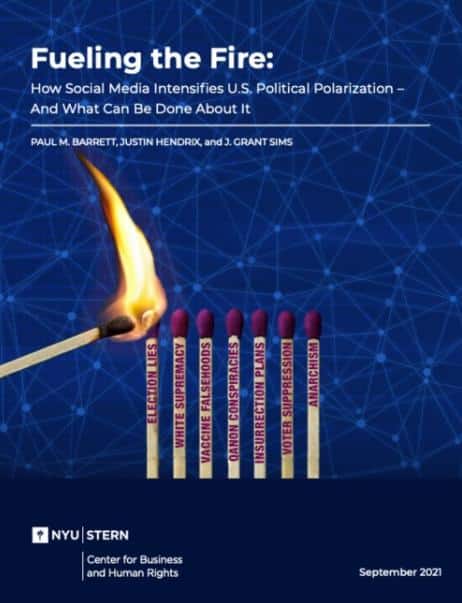 *NEW YORK – As a House select committee investigates the causes of the January 6 Capitol insurrection, a new report released today finds that social media platforms have played a major role in exacerbating political polarization that can lead to such extremist violence.
*NEW YORK – As a House select committee investigates the causes of the January 6 Capitol insurrection, a new report released today finds that social media platforms have played a major role in exacerbating political polarization that can lead to such extremist violence.
The report, “Fueling the Fire: How Social Media Intensifies U.S. Political Polarization—And What Can Be Done About It,” was released by the NYU Stern Center for Business and Human Rights and also makes recommendations about what the tech industry and government can do to address the problem. It was authored by disinformation and content moderation researcher Paul Barrett, the Center’s deputy director; NYU associate research scientist and adjunct professor Justin Hendrix; and NYU research fellow Grant Sims.
The NYU report finds that, while rising levels of polarization in the U.S. predate social media, the platforms have played an instrumental role in exacerbating the trend in recent years, particularly since the 2016 election and Donald Trump’s presidency. Facebook, for one, has disavowed responsibility for partisan hatred. The company’s vice president for global affairs, Nick Clegg, has argued: “What evidence there is simply does not support the idea that social media, or the filter bubbles it supposedly creates, are the unambiguous driver of polarization that many assert.”
But the NYU report concludes that social media use has intensified political divisiveness and polarization, based on social science research and more than 40 interviews with scholars, industry insiders, experts and activists. Moreover, absent significant reforms by the federal government and the social media companies themselves, partisan hatred will continue to have dire consequences, the report shows. These include declining trust in institutions; scorn for well-established facts; legislative dysfunction; erosion of democratic norms; and, ultimately, real-world violence, such as the January 6 insurrection.
OTHER NEWS ON EURWEB: Michelle Obama Recalls Moment She Heard About 9/11 Terrorist Attack
![]() In order to combat these trends, the report offers practical recommendations. For the government, it recommends:
In order to combat these trends, the report offers practical recommendations. For the government, it recommends:
- Mandating more disclosure about the inner workings of the platforms. Congress and the Biden administration should require that Facebook, Twitter, YouTube, and other platforms share certain data on their ranking, recommendation, and removal algorithms for researchers and regulators to
- Empowering the Federal Trade Commission to create and enforce new industry standards. The FTC should draft a new set of rules that define the level of reasonable care expected of the social media companies in addressing hateful, extremist, or threatening content
- Investing in alternative social media platforms. Congress should provide funding through federal agencies to develop new, pro-democratic social media platforms. Given the market dominance of current incumbents, public support is necessary to nurture
- Investigating social media’s role in the events of January The House select committee should dedicate substantial resources to investigating how social media was used to plan the Capitol insurrection and how to make similar events less likely in future.
![]() For social media companies, the report recommends:
For social media companies, the report recommends:
- Changing their algorithms to stop rewarding inflammatory content. The platforms should change their content-promotion systems to reduce the spread of polarizing content. This may include hiding “like” and share counts on posts, de-emphasizing extremist political content in news feeds, and promoting authoritative
- Investing more in content moderation. The platforms should double the number of human content moderators who police harmful content online, and bring them in-house, rather than outsourcing this critical work to third-party
- Partnering with civil society groups to fight online Social media companies should deepen their partnerships with nonprofit organizations dedicated to identifying and combating false and harmful content online, especially around issues like elections and COVID-19.
- Experimenting with depolarization interventions. Facebook and others should use their massive user bases and analytical data to experiment with interventions that encourage civility and may depolarize
“Social media didn’t create today’s partisan hatred, but it intensifies the problem,” said Paul Barrett, the report’s primary author and deputy director of the NYU Stern Center for Business and Human Rights. “This is vital and urgent because the consequences of polarization range from a loss of faith in democracy to the sort of political violence we saw during the insurrection at the Capitol. To arrest these trends, it’s critical that the social media companies—Facebook, YouTube, Twitter, and others— acknowledge their role in the process and make significant reforms, while Congress and the Biden administration apply pressure for more transparency and accountability.”
“The disturbing human rights implications of extreme polarization exacerbated by social media, which we’ve observed abroad in places like Myanmar and Sri Lanka, are now coming home to roost in the United States,” said Michael Posner, director of the NYU Stern Center for Business and Human Rights. “As we saw during the January 6 insurrection, disinformation and partisan hostility that start online don’t stay there; they manifest in the real world, with dire consequences for our democracy. That is why it’s critical that industry and government work together on solutions to reverse this trend before it’s too late.”
###
About the NYU Stern Center for Business and Human Rights
The NYU Stern Center for Business and Human Rights challenges and empowers companies and future business leaders to make practical progress on human rights. More information is available at bhr.stern.nyu.edu, on Twitter at @NYUSternBHR, and on Facebook at @bhr.stern.nyu.edu.
We Publish News 24/7. Don’t Miss A Story. Click HERE to SUBSCRIBE to Our Newsletter Now!





